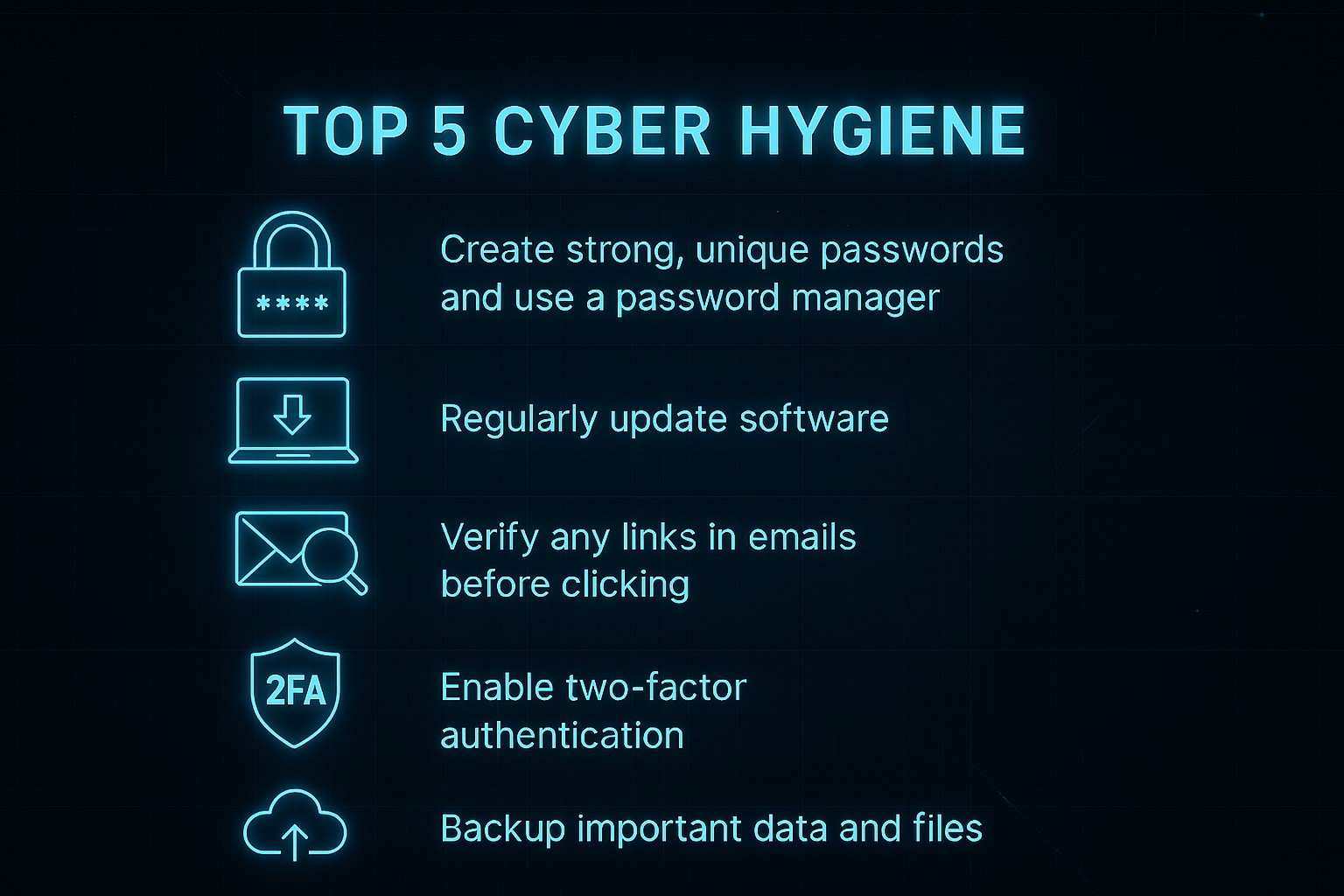Cyber Hygiene: The Essential Digital Self-Care Routine
Simple daily habits that protect your accounts and personal data in an increasingly connected world
When you think of self-care, you might picture a spa day, a jog in the park, or a healthy meal. But in today's hyper-connected world, self-care also means protecting your digital life. This practice is called cyber hygiene—and it's just as essential as washing your hands or brushing your teeth. Think of it as simple, daily habits that keep your accounts and personal data safe.
Why Cyber Hygiene Matters
Just as poor personal hygiene can lead to illness, poor cyber hygiene can expose you to major risks. Every day, individuals and businesses are targeted by phishing scams, malware, and social engineering. Most attacks aren't high-tech; they succeed because of simple oversights—like weak passwords or ignored updates.
By practicing good cyber hygiene, you build a strong defense and make yourself a harder target.
Your Daily Digital Self-Care Routine
Lock Down Your Passwords
Your passwords are the keys to your digital life. Using weak or repeated ones is like leaving your front door unlocked.
- Create strong, unique passwords for every account.
- Use a password manager (e.g., 1Password, Dashlane) to generate and store them securely.
- Enable two-factor authentication (2FA) wherever possible.
Update Before It's Too Late
Those annoying "update now" pop-ups? They're actually security shields. Updates patch holes that hackers are waiting to exploit.
- Update your phone, laptop, and apps as soon as updates are available.
- Turn on automatic updates where possible.
- Don't postpone security updates – they're the most critical ones.
Spot the Red Flags in Emails
Phishing emails try to trick you into clicking or sharing sensitive info. Here's a common scam:
Subject: Action Required – Your Netflix Account Is On Hold
Body:
We have been unable to process your payment. Your account will be suspended within 24 hours unless you update your billing details. [Click here]
At first glance, it looks urgent. But notice these red flags:
- Generic greeting with no personalization
- Threat of immediate suspension to create urgency
- Suspicious link instead of instructions to log in directly
- Subtle pressure to act quickly without thinking
To protect yourself:
- Always double-check the sender's email address (not just the display name).
- Hover over links to see the actual URL before clicking.
- Don't click unless you're sure—it's safer to log in directly on the official site.
- When in doubt, contact the company directly using their official phone number.
Quick Quiz: Test Your Cyber Hygiene
True or False?
1. Using the same strong password across multiple accounts is safe.
✅ Answer
False. Even a strong password becomes a liability when reused. If one site is breached, all your accounts are at risk.
2. Ignoring software updates won't affect your security much.
✅ Answer
False. Updates often contain critical security patches. Delaying them leaves your device vulnerable to known exploits.
3. A real company will always give you time and options before suspending your account.
✅ Answer
True. Legitimate companies don't threaten immediate suspension via email. They provide multiple notifications through different channels.
Real-World Case Study: LinkedIn Social Engineering
Recently, attackers used fake job offers on LinkedIn to target professionals. The messages looked legitimate and included malicious attachments disguised as resumes or job descriptions. Victims who downloaded these files unknowingly gave attackers access to their systems, leading to data theft and network compromise.
Cyber Hygiene Takeaway:
Even trusted platforms can be abused. Always verify unexpected job offers or attachments before clicking. Contact the supposed sender through a different channel to confirm the message is legitimate.
Top 5 Cyber Hygiene Habits

Essential cyber hygiene habits everyone should practice daily.
Start Today
Cyber hygiene isn't about paranoia—it's about preparation. Small, consistent habits make a big difference in protecting your digital life.
- Change one password to something strong and unique.
- Update one device that's been showing notifications.
- Pause before clicking links in emails—verify first.
- Enable two-factor authentication on your most important accounts.
- Back up your most important data.
These tiny steps build lasting protection. Your digital self will thank you.
Ready to Test Your Cybersecurity Knowledge?
Challenge yourself with our interactive quizzes and see how well you can spot digital threats.
 Access Deny
Access Deny